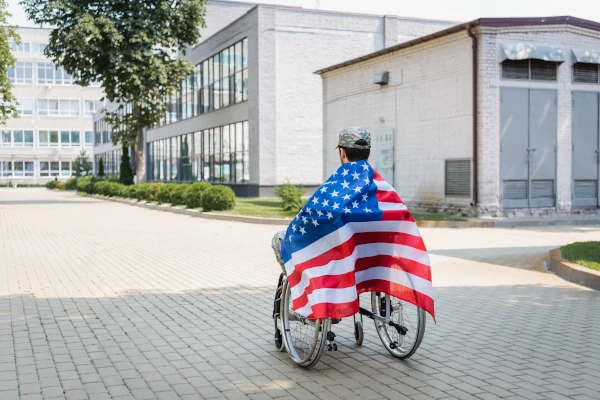

The Department of Veterans Affairs offers several grant programs that help disabled veterans modify their homes for accessibility and independent living. These grants provide substantial financial assistance without requiring repayment, making home modifications possible for veterans with service-connected disabilities.
Understanding VA Housing Grants
VA housing grants differ fundamentally from loans—they're monetary gifts that don't require repayment. The VA provides these grants to eligible veterans who need to adapt their homes to accommodate disabilities resulting from their military service.
Key features of VA housing grants:
No repayment required. Grants are gifts, not loans, eliminating future financial obligations.
Multiple use opportunities. Most grants can be used more than once during your lifetime, up to the lifetime maximum amount.
Flexible application. Funds can be used for new construction, home modifications, or adaptations to family members' homes in certain circumstances.
Specially Adapted Housing (SAH) Grant
The SAH grant provides the most substantial financial assistance for veterans with specific severe disabilities. For 2024, the maximum grant amount is $121,812.
Eligibility requirements. You qualify for the SAH grant if you have a service-connected disability that includes:
Loss or loss of use of both lower extremities, requiring you to use braces, crutches, canes, or a wheelchair for mobility.
Blindness in both eyes with visual acuity of 20/200 or less, or with a field defect creating severe limitation of vision.
Loss or loss of use of one lower extremity combined with residuals of organic disease or injury that require you to use a wheelchair for mobility, or residuals of involvement of both lower extremities from disease or injury that require you to use a wheelchair for mobility.
Loss or loss of use of one lower extremity combined with loss or loss of use of one upper extremity that preclude natural elbow and knee action with prosthetic devices.
Severe burn injuries.
How you can use SAH funds:
Purchase land and construct an adapted home specifically designed for your needs.
Build an adapted home on land you already own.
Modify an existing home you own or will own to make it accessible.
Pay down the principal on a mortgage for an adapted home you already own.
Lifetime usage limits. You can use the SAH grant up to six times during your lifetime, though the total amount received cannot exceed the current maximum grant amount. This flexibility allows you to adapt multiple homes as your needs or living situation changes.
Special Home Adaptation (SHA) Grant
The SHA grant provides assistance for veterans whose disabilities, while significant, don't meet SAH criteria. The maximum SHA grant for 2025 is $23,444.
Eligibility requirements. You qualify for the SHA grant if you have a service-connected disability that includes:
- Blindness in both eyes with visual acuity of 5/200 or less.
- Loss or loss of use of both hands.
- Severe respiratory or cardiovascular conditions that require you to use supplemental oxygen or have significant limitations.
Permitted uses:
Purchase an adapted home that meets your accessibility needs.
Modify a home you own or will own to accommodate your disability.
Lifetime usage limits. Like the SAH grant, you can use SHA funds up to six times during your lifetime, not exceeding the maximum grant amount.
Temporary Residence Adaptation (TRA) Grant
The TRA grant helps veterans modify homes they're living in temporarily, typically family members' residences.
Who qualifies. Veterans eligible for either SAH or SHA grants can apply for TRA funding to adapt a temporary residence.
Grant amounts for 2025:
- Up to $49,062 for veterans eligible for SAH.
- Up to $8,760 for veterans eligible for SHA.
Common scenarios:
You're living with family members while determining your permanent housing situation.
You're temporarily relocating for medical treatment.
You need to stay with relatives during home construction or major renovations.
Important limitation. TRA grants don't count against your SAH or SHA lifetime usage limits, but the adapted home must be where you're actually residing, not just visiting.
Home Improvements and Structural Alterations (HISA) Grant
The HISA grant provides funding for modifications necessary to accommodate service-connected disabilities or aging-related conditions.
Two grant types:
- Up to $6,800 for service-connected disability modifications.
- Up to $2,000 for non-service-connected disability or aging-related modifications.
Eligible improvements:
- Installing grab bars in bathrooms.
- Widening doorways for wheelchair access.
- Adding entrance ramps.
- Modifying kitchen counters and cabinets.
- Improving lighting for vision impairments.
Key difference from SAH/SHA. HISA grants focus on specific medical necessity rather than comprehensive home adaptation. They work well for targeted modifications that other grant programs don't cover.
Common Home Modifications Funded by These Grants
Accessibility ramps. Installing permanent ramps at entrances eliminates barriers that prevent wheelchair or walker use. Proper ramps include appropriate slope ratios, handrails, and weather-resistant materials.
Doorway widening. Standard doorways often prevent wheelchair passage. Widening doorways to 36 inches or more throughout your home ensures accessibility to all rooms.
Bathroom adaptations. Roll-in showers, grab bars, raised toilets, accessible sinks, and improved lighting transform bathrooms into safe, usable spaces for veterans with mobility limitations.
Kitchen modifications. Lowered countertops and cabinets, accessible appliances, and improved workspace layouts allow veterans with mobility limitations to prepare meals independently.
Elevator or lift installation. For multi-story homes, residential elevators or stairlifts provide access to all floors without requiring stair climbing.
HVAC and ventilation improvements. Veterans with respiratory conditions benefit from upgraded air filtration, humidity control, and improved ventilation systems.
Technology integration. Smart home systems, voice-activated controls, and automated features increase independence for veterans with various disabilities.
Application Process
Verify your eligibility. Ensure you have the required service-connected disability rating. You'll need documentation from the VA confirming your disability and its service connection.
Create an eBenefits account. Register at eBenefits.va.gov if you haven't already. This portal provides access to VA services and allows online application submission.
Gather required documentation:
- VA file number or Social Security number.
- Certificate of Eligibility for VA home loan benefits (if applicable).
- Documentation of your service-connected disability.
- Property information if you already own the home you plan to adapt.
- Construction or modification plans and cost estimates.
Submit your application. You can apply through:
- Online at eBenefits.va.gov (fastest method).
- Mail to your VA regional loan center.
- In person at your local VA office.
Application form. Complete VA Form 26-4555 for SAH or SHA grants. For HISA grants, work with your VA healthcare provider who will submit the necessary paperwork.
Processing timeline. The VA typically processes grant applications within several weeks, though complex cases may take longer. You'll receive notification of approval or any additional information needed.
Working with Contractors and Builders
Pre-approval recommended. Before starting construction or modifications, get VA approval for your plans. This ensures the work meets grant requirements and prevents issues with reimbursement.
Contractor selection. Choose contractors experienced with accessible design and VA grant requirements. Ask for references from other veterans who've completed similar projects.
Cost estimates. Obtain detailed estimates for all planned work. The VA reviews these estimates during the approval process to ensure costs are reasonable.
Payment methods. The VA can pay contractors directly, reimburse you for work already completed, or provide a combination depending on your situation and the contractor's willingness to work with VA payment systems.
Combining Multiple Grant Programs
Strategic planning maximizes benefits. Veterans may qualify for multiple grant programs simultaneously. Strategic use of different grants can fund more comprehensive adaptations than any single program allows.
Example scenario: A veteran eligible for SAH might use that grant for major structural changes like adding an accessible bathroom and widening doorways, then use a HISA grant for specific medical equipment like a stair lift or grab bars.
Coordination with other benefits. VA housing grants can work alongside other benefits like vocational rehabilitation services or pension programs, creating a comprehensive support package.
Maintaining Grant-Funded Improvements
No ongoing obligations. Once modifications are complete, you have no obligation to repay the grant regardless of how long you live in the home.
Selling adapted homes. If you sell a home adapted with grant funds, you retain the proceeds. The grant doesn't create any lien or obligation to the VA.
Future modifications. As your needs change, you can apply to use remaining grant eligibility (if any) for additional modifications or for adapting a new home.
Special Considerations
Rental properties. Generally, grants apply to homes you own or will own. However, TRA grants can apply to homes you're residing in temporarily, even if owned by family members.
New construction. SAH grants can fund building a new home designed for accessibility from the ground up. This often provides better long-term value than modifying existing structures.
Energy efficiency. While installing accessibility features, consider energy-efficient options. Though grant funds must go to accessibility modifications, combining projects can reduce overall costs.
Resale value considerations. Accessibility features increasingly appeal to aging populations, potentially maintaining or increasing home values despite modifications being made for specific disabilities.
Getting Help with the Process
VA regional offices. Contact your regional VA loan center for personalized assistance with applications and questions about eligibility.
Veterans Service Organizations (VSOs). Organizations like the DAV, VFW, and American Legion provide free assistance with VA benefit applications, including housing grants.
State and local veteran services. Many states and municipalities offer additional assistance or supplementary programs that complement VA housing grants.
VA phone assistance. Call 877-827-3702 to speak with representatives who can answer questions, check application status, and provide guidance throughout the process.
Common Questions and Misconceptions
"I don't own a home yet. Can I still apply?" Yes. You can receive approval and use grant funds toward purchasing and adapting a home, or for new construction.
"Will this affect my other VA benefits?" No. Housing grants don't reduce or affect other VA benefits like disability compensation, healthcare, or education benefits.
"What if I need more than the grant amount?" You're responsible for costs exceeding grant limits. However, some veterans combine grants with VA home loans, personal savings, or assistance from non-profit organizations.
"How long do I have to use the grant?" There's no time limit. Once approved, you can use your grant when ready, though you should update the VA if your plans or circumstances change significantly.
Taking the First Step
These VA housing grants represent substantial benefits earned through your military service. If you're a disabled veteran struggling with home accessibility, investigating these programs is worth your time.
The application process, while requiring documentation and planning, is designed to help veterans. Don't let concerns about paperwork or complexity prevent you from pursuing benefits you've earned and deserve.
Learn More About Your VA Housing Grant Eligibility
Understanding which VA housing grants you qualify for and how to maximize their benefits requires specialized knowledge. While we focus on mortgage lending, we work with many veterans and understand how housing grants interact with VA home loans. We can connect you with appropriate VA resources and help you understand how grant-funded modifications might affect your home financing options.
Contact us today to discuss your situation and learn how we can support your journey toward a more accessible home.
